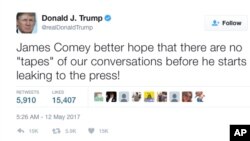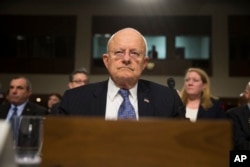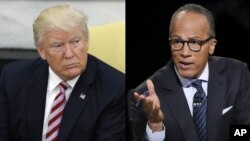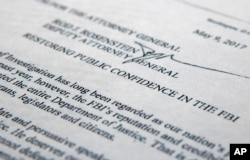President Donald Trump has escalated his feud with ousted former FBI director James Comey, implying there are secret recordings of one of their private conversations from earlier this year.
In an early morning tweet Friday, President Trump said, "James Comey better hope that there are no ‘tapes’ of our conversations before he starts leaking to the press!"
Clapper clarifies comments
In comments to MSNBC Friday, former Director of National Intelligence James Clapper said he did not know whether there was any collusion between the Trump campaign and Russian officials. Nor should he have, he said, because the issue is FBI territory.
Clapper said his practice is always to defer to the director of the FBI "on whether, when and what to tell me about a counterintelligence investigation."
His comment contradicted a Trump tweet saying Clapper did not believe there was collusion.
Trump on Tuesday fired Comey, who was leading an investigation into alleged Russian hacking of the 2016 election, as well as possible collusion between Moscow and the Trump campaign.
White House officials insist the firing had nothing to do with the Russia probe, though the president appears to have undermined that assertion during a televised interview Thursday.
Much of the controversy centers around a White House dinner meeting earlier this year between Trump and Comey.
A New York Times report late Thursday said that Trump asked Comey to “pledge his loyalty to him” during the dinner meeting.
The report said Comey refused to make the pledge, but instead told Trump that he would "always be honest with him." Trump pressed Comey several times for his loyalty, and finally Comey told the president he would have the FBI director's "honest loyalty," according to the newspaper account.
White House officials dispute the accuracy of that account, which relied on unnamed sources who reportedly have spoken with Comey about the meeting.
Comey himself has made no such allegations. In a farewell note to FBI staff, Comey played down the dispute, saying: “I have long believed that a President can fire an FBI Director for any reason, or for not reason at all.”
The issue is unlikely to go away, however, especially in light of Trump’s tweet on Friday implying that the conversation had been recorded.
In a television interview Thursday with NBC News, Trump gave a different account of the dinner. The president said Comey requested the meeting because the FBI director wanted to keep his job. The president did not mention a loyalty pledge request.
The president also said he had asked the head of the nation’s prime law enforcement agency whether he was being investigated.
Trump said he asked Comey “if it’s possible, would you let me know, am I under investigation? He said, ‘You are not under investigation.’”
The president, in the television interview, repeated “I am not under investigation” when asked about Comey’s sworn testimony that there is an ongoing probe into his 2016 president campaign and possible collusion with the Russian government.
Watch: Trump Escalates Feud with Comey
'Highly inappropriate'
Legal analyst Bradley Moss, who specializes in national security issues, called such an exchange "highly inappropriate" at a minimum.
“There is supposed to be a line that is not crossed, including asking the FBI if you yourself are the target of the investigation,” Moss told VOA.
But Moss, deputy executive director of The James Madison Project, a Washington-based organization that promotes government accountability, added it is “difficult to say if it is actually illegal, since Comey allegedly responded that Trump was not under investigation.”
Laurence Tribe, a Harvard professor specializing in constitutional law, wrote on Twitter it is “now totally clear that Trump’s firing of Comey was an obstruction of justice. That was the first article of impeachment against Nixon.”
That is a reference to former President Richard Nixon, who resigned in 1974 less than a month after the House of Representatives began impeachment proceedings against him.
Trump asserts in Thursday’s interview he would have fired Comey even if top Justice Department officials had not recommended it, calling former President Barack Obama's appointee “a showboat. He's a grandstander.”
Comey was directing investigations into connections between the Trump campaign and Russian officials, along with possible meddling by Moscow in the 2016 U.S. presidential election.
Rosenstein memo
The White House on Thursday continued to defend its dismissal of the FBI chief and denied it tried to put the responsibility on Deputy Attorney General Rod Rosenstein's memo for the abrupt removal.
“I don’t think there was ever an attempt to pin the decision on the deputy attorney general” for Comey’s firing, said Sarah Huckabee Sanders, the White House principal deputy press secretary.
Sanders, White House Press Secretary Sean Spicer and even Vice President Mike Pence earlier had asserted, though, that Trump’s firing decision was based on the deputy attorney general’s memo.
At the center of the scrutiny is whether Rosenstein was instructed to draft a memo justifying Comey's dismissal or whether he decided to write the document without direction.
Rosenstein was upset with suggestions made by the White House that his memo suggested he called for Comey’s firing Tuesday, according to The Washington Post and ABC News.
Rosenstein’s memo mentioned Comey’s mishandling of last year’s investigation into Democratic presidential candidate Hillary Clinton’s use of a private email server while she was secretary of state.
Russian investigation
News media reports quote sources who assert Comey was ousted, however, because he wanted to intensify the Russia investigation.
The firing has prompted Democrats to amplify their calls for an independent investigation of the Russia case. The attorneys general of 20 states also are calling for the appointment of a special counsel.
But Friday afternoon, Rosenstein said he did not see the need at this time for a special prosecutor, CNN reported.
Comey was appointed by Obama in 2013. FBI directors serve 10-year terms to insulate them from political interference, but can be removed by presidents.
Until now, the only other time an FBI director had been dismissed was in 1993 when President Bill Clinton removed William Sessions, who refused to leave voluntarily amid ethical concerns.











